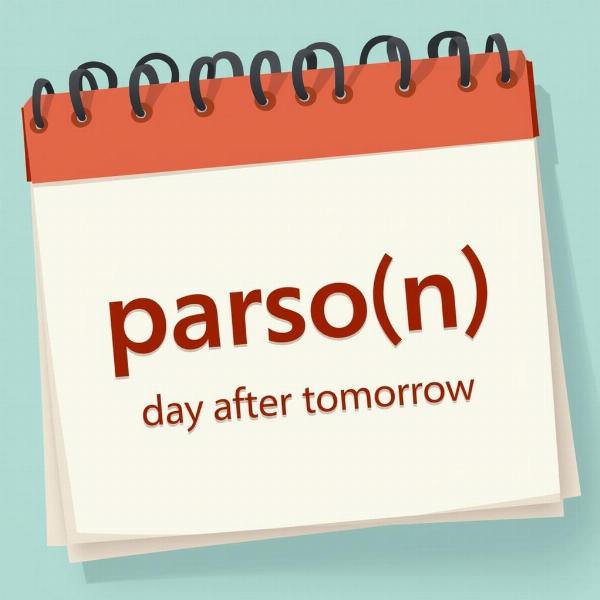Understanding how to say “tomorrow” in Hindi is essential for anyone learning the language or planning to visit India. While a direct translation exists, grasping its cultural nuances adds depth to your communication and demonstrates respect for local customs. This article explores the meaning of “tomorrow” in Hindi, delves into its various forms, and provides practical examples to help you use it confidently in everyday conversations.
Exploring “Kal” – The Hindi Word for Tomorrow
The most common Hindi word for “tomorrow” is “kal” (कल). It’s a simple, versatile word used across various dialects and understood throughout India. While “kal” is the most straightforward translation, it’s important to remember that Hindi, like many languages, offers different ways to express future time, depending on the context and the level of formality. Knowing these nuances can greatly enhance your communication skills.
Different Ways to Say “Tomorrow” in Hindi
While “kal” covers most situations, there are other ways to express the concept of “tomorrow” in Hindi. These variations often reflect the specific time of day or add emphasis to the future action.
- “Kal subah” (कल सुबह): This phrase translates to “tomorrow morning” and is used when referring to something happening specifically in the morning.
- “Kal shaam” (कल शाम): Meaning “tomorrow evening,” this phrase pinpoints actions or events occurring in the evening.
- “Kal raat” (कल रात): This phrase means “tomorrow night” and is used when referring to something happening during the night.
Practical Examples and Usage
Let’s see how “kal” and its variations are used in everyday Hindi conversations.
- “Main kal aaunga” (मैं कल आऊँगा): “I will come tomorrow.”
- “Hum kal subah milenge” (हम कल सुबह मिलेंगे): “We will meet tomorrow morning.”
- “Kya aap kal shaam film dekhne jayenge?” (क्या आप कल शाम फिल्म देखने जाएँगे?): “Will you go to watch a movie tomorrow evening?”
Common Phrases Using “Tomorrow” in Hindi
Several common phrases incorporate “kal,” enriching your Hindi vocabulary and allowing you to express yourself more naturally. Let’s look at some examples.
- “Kal milte hain” (कल मिलते हैं): “See you tomorrow.” – A casual way to end a conversation.
- “Kal baat karenge” (कल बात करेंगे): “We’ll talk tomorrow.” – Often used when postponing a discussion.
- “Kal phir milenge” (कल फिर मिलेंगे): “We’ll meet again tomorrow.” – Implies a planned meeting or continuation of an activity.
“Tomorrow” and Indian Culture
The concept of time in India can be somewhat flexible. While punctuality is appreciated, delays are not uncommon. This cultural nuance influences how “tomorrow” is sometimes perceived and used. Understanding this aspect can help avoid misunderstandings and manage expectations. It’s always best to confirm timings if something is crucial.
“Day After Tomorrow” and “Day Before Yesterday”
While focusing on “tomorrow,” it’s also helpful to know how to say “day after tomorrow” and “day before yesterday” in Hindi. “Day after tomorrow” is “parso(n)” (परसों), and “day before yesterday” is “parso(n)” (परसों) also. The context usually clarifies which meaning is intended.
 Visual representation of "Day After Tomorrow" in Hindi
Visual representation of "Day After Tomorrow" in Hindi
Conclusion: Mastering “Tomorrow” in Hindi
Understanding the meaning and usage of “tomorrow” in Hindi – primarily “kal” – is a fundamental step in learning the language. By exploring its variations and incorporating it into everyday phrases, you can communicate more effectively and show respect for Indian culture. Now that you’re equipped with this knowledge, practice using “kal” and its variations in your conversations. tomorrow in hindi meaning is a key concept to grasp, and with practice, you’ll be using it like a native speaker in no time!
FAQ
- What is the most common way to say “tomorrow” in Hindi? Kal (कल) is the most common and widely understood word for “tomorrow.”
- How do I say “tomorrow morning” in Hindi? “Tomorrow morning” is kal subah (कल सुबह).
- Is “kal” used formally and informally? Yes, “kal” is suitable for both formal and informal conversations.
- What is the Hindi word for “day after tomorrow”? “Day after tomorrow” is parso(n) (परसों).
- How do I say “see you tomorrow” in Hindi? You can say “Kal milte hain” (कल मिलते हैं).
- Is Indian culture flexible with time? While punctuality is valued, there is a degree of flexibility with time in Indian culture. It’s always a good idea to confirm important timings.
- What’s the best way to learn these phrases? Practice! Use these phrases in conversations and immerse yourself in the language to improve fluency.
Related Articles:
- i will do this tomorrow meaning in hindi
- we will talk tomorrow meaning in hindi
- tomorrow i am on leave meaning in hindi
- day before tomorrow meaning in hindi
Meaning-Hindi.in is your trusted partner for professional Hindi translation services. We specialize in various fields, including business and commercial document translation, legal and certified translation, technical and user manual translation, website and software localization, educational and academic document translation, and express translation services. Our expertise in diverse sectors allows us to deliver accurate, culturally sensitive, and high-quality translations tailored to your specific needs. Contact us today for all your Hindi translation requirements! Email: [email protected], Phone: +91 11-4502-7584. Meaning-Hindi.in is here to bridge the language gap for you.